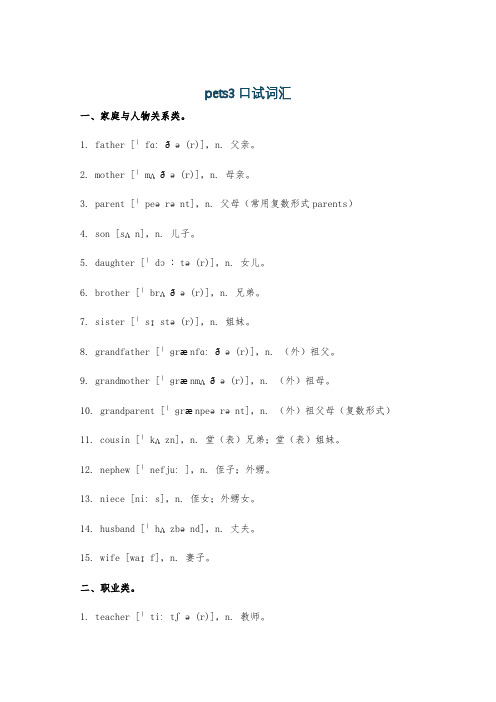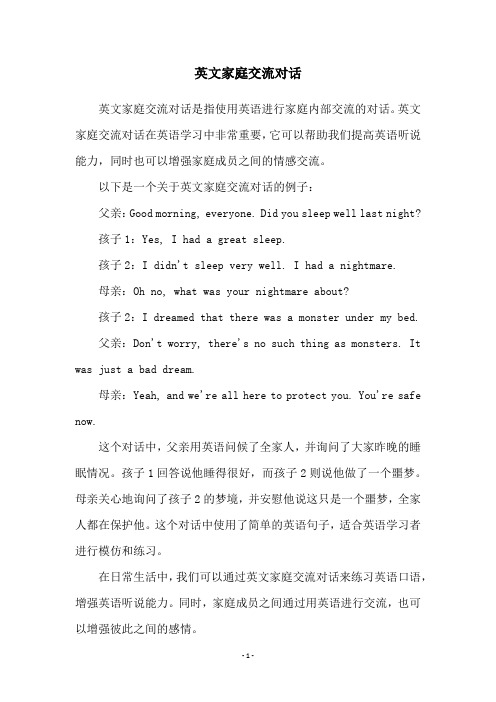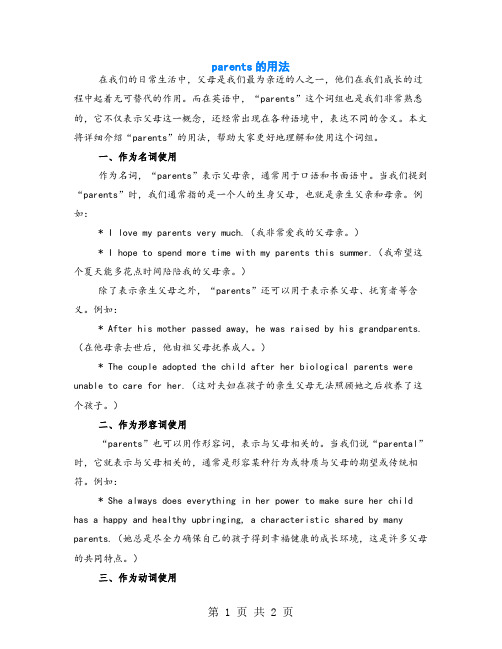父母常用英语Parents speaking English
pets3口试词汇

pets3口试词汇一、家庭与人物关系类。
1. father [ˈfɑːðə(r)],n. 父亲。
2. mother [ˈmʌðə(r)],n. 母亲。
3. parent [ˈpeərənt],n. 父母(常用复数形式parents)4. son [sʌn],n. 儿子。
5. daughter [ˈdɔːtə(r)],n. 女儿。
6. brother [ˈbrʌðə(r)],n. 兄弟。
7. sister [ˈsɪstə(r)],n. 姐妹。
8. grandfather [ˈɡrænfɑːðə(r)],n. (外)祖父。
9. grandmother [ˈɡrænmʌðə(r)],n. (外)祖母。
10. grandparent [ˈɡrænpeərənt],n. (外)祖父母(复数形式)11. cousin [ˈkʌzn],n. 堂(表)兄弟;堂(表)姐妹。
12. nephew [ˈnefjuː],n. 侄子;外甥。
13. niece [niːs],n. 侄女;外甥女。
14. husband [ˈhʌzbənd],n. 丈夫。
15. wife [waɪf],n. 妻子。
二、职业类。
1. teacher [ˈtiːtʃə(r)],n. 教师。
2. doctor [ˈdɒktə(r)],n. 医生。
3. nurse [nɜːrs],n. 护士。
4. engineer [ˌendʒɪˈnɪə(r)],n. 工程师。
5. worker [ˈwɜːkə(r)],n. 工人。
6. farmer [ˈfɑːmə(r)],n. 农民。
7. driver [ˈdraɪvə(r)],n. 司机。
8. policeman [pəˈliːsmən],n. 警察(复数形式policemen)9. policewoman [pəˈliːswʊmən],n. 女警察(复数形式policewomen)10. businessman [ˈbɪznəsmæn],n. 商人(复数形式businessmen)11. businesswoman [ˈbɪznəswʊmən],n. 女商人(复数形式businesswomen)12. secretary [ˈsekrətri],n. 秘书。
日常生活中可以对小孩说的英语

US English for parents speaking English as a non-native language with their preschool children - 12/03/02 - sent by A./links.html英语非母语父母对学前孩子使用的美式英语。
Also: this list is just a compilation of current usage. It’s not a recommendation that people should actually say all these things to their own children.以下所列只是对现在用法的一个总结编辑,并不是建议大家应该对孩子说所有这些话。
1. Diminutive/child-like words for things: 小孩喜欢的物品cuddly (any plush toy, stuffed animal, etc) 想抱抱的(任何毛绒绒的玩具,填充动物等)owie, booboo A child’s injury (could be a cut, bruise, burn, etc...)亲亲孩子的伤口(可能是割伤,擦伤,灼伤。
)dolly (for a doll) 娃娃duckie or ducky (toy duck) 小鸭子teddybear (toy stuffed/plush bear) 泰迪熊,或者是填充、毛绒熊bally or ballie (for a toy ball) 玩具球PJ’s/nighties (for pajamas) 睡衣shoesies (for shoes) (only when being affectionate or playful) 鞋子(只是用于好玩的时候)footsies (for feet) (only when being affectionate or playful, e.g., “Whose footsies are these?”, said w hile pretending not to know.) 脚脚(只是在逗乐的时候,比如:这是谁的脚脚啊?,假装不知道的说)(Note: there’s a game called “footsie”, where each person tries to put his foot over the other person’s.)(注:有个叫做“脚”的游戏,每个人都努力想把脚放到别人的脚上。
英文家庭交流对话

英文家庭交流对话
英文家庭交流对话是指使用英语进行家庭内部交流的对话。
英文家庭交流对话在英语学习中非常重要,它可以帮助我们提高英语听说能力,同时也可以增强家庭成员之间的情感交流。
以下是一个关于英文家庭交流对话的例子:
父亲:Good morning, everyone. Did you sleep well last night?
孩子1:Yes, I had a great sleep.
孩子2:I didn't sleep very well. I had a nightmare.
母亲:Oh no, what was your nightmare about?
孩子2:I dreamed that there was a monster under my bed.
父亲:Don't worry, there's no such thing as monsters. It was just a bad dream.
母亲:Yeah, and we're all here to protect you. You're safe now.
这个对话中,父亲用英语问候了全家人,并询问了大家昨晚的睡眠情况。
孩子1回答说他睡得很好,而孩子2则说他做了一个噩梦。
母亲关心地询问了孩子2的梦境,并安慰他说这只是一个噩梦,全家人都在保护他。
这个对话中使用了简单的英语句子,适合英语学习者进行模仿和练习。
在日常生活中,我们可以通过英文家庭交流对话来练习英语口语,增强英语听说能力。
同时,家庭成员之间通过用英语进行交流,也可以增强彼此之间的感情。
英语学习家庭成员的称呼

英语学习家庭成员的称呼在英语学习中,家庭成员是我们日常会用到的词汇之一。
正确使用家庭成员的称呼是有效提高英语交流能力的重要一步。
本文将为大家介绍英语中家庭成员的称呼,帮助大家掌握这些常用的词汇。
爸爸 (Father/Dad)在英语中,我们通常用“Father”来称呼爸爸,这是一种正式的表达方式。
而在日常口语交流中,我们更常用的是“Dad”这个亲切的称呼。
当我们感到亲近且熟悉的时候,可以用“Dad”来称呼爸爸。
妈妈 (Mother/Mom)与爸爸一样,我们可以用“Mother”或者更亲切的“Mom”来称呼妈妈。
这两种称呼都可以在正式场合和日常口语中使用。
姐姐 (Elder Sister/Sister)姐姐是我们家庭中的年长的女性成员。
在英语中,我们可以用“Elder Sister”或者简单地用“Sister”来称呼姐姐。
哥哥 (Elder Brother/Brother)哥哥通常是家庭中的年长的男性成员。
英语中,我们可以用“Elder Brother”或者简单的“Brother”来称呼哥哥。
妹妹 (Younger Sister/Sister)妹妹是家庭中的年幼的女性成员。
我们可以用“Younger Sister”或者“Sister”来称呼妹妹。
弟弟 (Younger Brother/Brother)弟弟一般指的是家庭中的年幼的男性成员。
在英语中,我们可以用“Younger Brother”或者“Brother”来称呼弟弟。
爷爷 (Paternal Grandfather/Grandfather)爷爷是我们父亲的父亲。
在英语中,我们通常用“Paternal Grandfather”或者更常用的“Grandfather”来称呼爷爷。
在正式场合,使用“Paternal Grandfather”更为合适。
奶奶 (Paternal Grandmother/Grandmother)奶奶是我们父亲的母亲。
在英语中,我们可以用“Paternal Grandmother”或者“Grandmother”来称呼奶奶。
英语听力中常用的人物关系

英语听力中常用的人物关系在英语听力中,我们经常会听到各种各样的人物关系,这些关系涉及到亲属关系、朋友关系、职业关系等等。
在学习英语听力的过程中,了解这些人物关系的含义和用法将有助于我们更好地理解听力材料,提高听力能力。
本文将介绍英语听力中常用的人物关系,包括亲属关系、朋友关系、职业关系等。
一、亲属关系1. Parents:父母(指父亲和母亲)例句:My parents are coming to visit me this weekend.(我的父母本周末要来看我。
)2. Grandparents:祖父母(指祖父、祖母、外祖父和外祖母)例句:I love spending time with my grandparents.(我喜欢和我的祖父母在一起。
)3. Siblings:兄弟姐妹(指兄弟和姐妹)例句:I have two siblings, a brother and a sister.(我有两个兄弟姐妹,一个哥哥和一个姐姐。
)4. Spouse:配偶(指丈夫或妻子)例句:My spouse and I have been married for 10 years.(我和我的配偶已经结婚10年了。
)5. Children:孩子(指儿子和女儿)例句:I have two children, a son and a daughter.(我有两个孩子,一个儿子和一个女儿。
)二、朋友关系1. Best friend:最好的朋友例句:My best friend and I have known each other since we were kids.(我和我最好的朋友从小就认识。
)2. Close friend:亲密的朋友例句:I have a close friend who always listens to me when I need someone to talk to.(我有一个亲密的朋友,每当我需要有人倾听时,她总是在那里。
父母儿子日常英语对话作文

父母儿子日常英语对话作文Father: Good morning, son. Did you sleep well?Son: Yes, Dad. I slept pretty well. How about you?Father: I slept well too. What are your plans for today?Son: I have a math test today, so I need to study for that. After that, I want to play some basketball with my friends.Father: That sounds like a good plan. Remember to study hard and do your best on the test.Son: I will, Dad. Thanks for reminding me. What are you planning to do today?Father: I have a meeting at work this morning, but I should be back by lunchtime. After that, I was thinking of doing some gardening in the backyard.Son: That sounds fun. Can I help you with the gardening?Father: Of course, son. I would love your help. We can work on it together after you finish studying.Son: Great, I look forward to it. 。
Father: Speaking of studying, have you finished your English homework?Son: Not yet, I still have a few pages to read. I'll finish it after breakfast.Father: Alright, make sure you don't leave it until the last minute. English is important, especially for your future.Son: I know, Dad. I'll try my best. 。
你要和父母沟通的英语

你要和父母沟通的英语Communicating with your parents in EnglishLearning how to communicate with your parents in English can be a challenge, especially if English is not your first language. Effective communication in any language is difficult and requires the use of words and body language. However, with a few tips, you can start to develop more effective communication with your parents in English.1. Listen CarefullyListening is one of the most important skills you can use in communication. When you are talking to your parents, pay attention to what they are saying. Try to absorb the information and repeat it back to them in your own words. This will show your parents that you are really listening and understanding what they are trying to tell you.2. Use Correct GrammarUsing correct grammar when speaking to your parents is important. If your parents are native English speakers, they will be able to understand you better if you use correct grammar. Be sure to practice your grammar and vocabulary so that you can communicate properly.3. Be RespectfulWhen speaking with your parents, it is important to use respectful language. Respectful language includes using polite words and phrases such as “please” and “thank you”. It is also important to remember to say “Yes, Mom” or “Yes, Dad”when they ask you a question. This type of language shows your parents that you are listening and that you consider their words to be valuable.4. Ask QuestionsAsking questions is one of the best ways to ensure that you understand what your parents are saying. Asking questions also shows your parents that you are interested in the conversation and that you are trying to understand what they are saying.5. Use Body LanguageBody language is an important part of communication and can help to convey your message more effectively. Try to stay engaged during a conversation by nodding and smiling, and make sure to make eye contact with your parents.Using these tips, you can start to develop more effective communication with your parents in English. With practice, your communication skills will improve and you will be able to communicate with your parents more effectively.。
parents的用法

parents的用法在我们的日常生活中,父母是我们最为亲近的人之一,他们在我们成长的过程中起着无可替代的作用。
而在英语中,“parents”这个词组也是我们非常熟悉的,它不仅表示父母这一概念,还经常出现在各种语境中,表达不同的含义。
本文将详细介绍“parents”的用法,帮助大家更好地理解和使用这个词组。
一、作为名词使用作为名词,“parents”表示父母亲,通常用于口语和书面语中。
当我们提到“parents”时,我们通常指的是一个人的生身父母,也就是亲生父亲和母亲。
例如:* I love my parents very much.(我非常爱我的父母亲。
)* I hope to spend more time with my parents this summer.(我希望这个夏天能多花点时间陪陪我的父母亲。
)除了表示亲生父母之外,“parents”还可以用于表示养父母、抚育者等含义。
例如:* After his mother passed away, he was raised by his grandparents.(在他母亲去世后,他由祖父母抚养成人。
)* The couple adopted the child after her biological parents were unable to care for her.(这对夫妇在孩子的亲生父母无法照顾她之后收养了这个孩子。
)二、作为形容词使用“parents”也可以用作形容词,表示与父母相关的。
当我们说“parental”时,它就表示与父母相关的,通常是形容某种行为或特质与父母的期望或传统相符。
例如:* She always does everything in her power to make sure her child has a happy and healthy upbringing, a characteristic shared by many parents.(她总是尽全力确保自己的孩子得到幸福健康的成长环境,这是许多父母的共同特点。
- 1、下载文档前请自行甄别文档内容的完整性,平台不提供额外的编辑、内容补充、找答案等附加服务。
- 2、"仅部分预览"的文档,不可在线预览部分如存在完整性等问题,可反馈申请退款(可完整预览的文档不适用该条件!)。
- 3、如文档侵犯您的权益,请联系客服反馈,我们会尽快为您处理(人工客服工作时间:9:00-18:30)。
Parents speaking English(1)Sleep and waking up(睡觉/起床)It’s time to go sleepy-bye.(到睡觉的时间了。
)Sweat dreams.(做个好梦。
)It’s time to go to bed./Time for bed.(该上床了。
)It’s time to have a nap.(该午休了。
)Wake up!(起床。
)Did you sleep well?(睡好了吗?)Time to get up.(该起床了。
)(2)Getting dressed(穿衣)It’s time to get dressed(该穿衣服了。
)What do you want to wear today?(今天想穿什么?)This shirt doesn’t go with those pants.(这件上衣和裤子不搭配。
)Stand still. / sit still.(站好/坐好。
)Now put on your sweater.(现在穿上毛衣。
)Take your clothes off./ Take off your clothes.(脱衣服。
)Pick up your socks, please.(请把袜子捡起来。
)Put on your trousers/shoes/coat/cap.穿上你的裤子/鞋子/外套/帽子。
(3)Meal time(吃饭)Come sit at the table.(过来坐在桌旁。
)Stop playing with your food.(不要再玩食物了。
)Don’t talk with your mouth full.(嘴里吃着不要说话。
)Help Daddy do the dishes.(帮助爸爸收盘子。
)Help Mommy to set the table.(帮助妈妈放桌子。
)Help us clear off the table.(帮我们收拾桌子。
)(4)Safty and injuries(安全和受伤)It’s bad for you!(这对你不好。
)I have told you many times not to do that.(我已经告诉你好几遍了不要那样做。
)Don’t sit too close to the TV.(不要坐的离电视太近。
)It’s nothing. It’s just a little cut.(不要紧,只是小伤口)Don’t touch the electrical outlets.(不要碰电源插座)Don’t try to plug/put anything in the outlet.(不要试图拔或放任何东西在插座里。
)Don’t touch anything on the sto ve.(不要碰炉子)The oven is very hot\\; you could burn yourself.(炉子很烫,你会烫着自己。
)Those tools are too sharp; they’re only for grownups.(那些工具太锋利了,只有大人能用)Don’t use others cup; you could catch his cold/germs that way.(不要用别人的杯子,那样会传染病菌)Don’t play with fire; it’s dangerous.(不要玩火,危险)Wait for the green light before you cross the street.(等绿灯亮了再过马路)Always look both side before crossing the street.(过马路前一定看两边。
)(5) Playing toys/games(玩玩具/游戏)Don’t leave toys on the floor where people will step on them.(不要把玩具放在地板上,别人会踩到它们)I’m going to count to ten.(我将数到十)Let’s pick up the toys and put them back.(咱们把玩具捡起来放回去。
)Want to play hide and seek?(玩捉迷藏吗?)Ready or not, here I come.(准备好了吗?我来了)Please put the toys/books back on the shelf.(请把玩具/书放回架子上。
)Want to play outside?(想出去玩吗?)(6) Bathroom talk(卫生间)Do you need to go potty?(你要去大/小便吗?)I need to go to the bathroom. (我要上厕所)Don’t unroll the toilet paper.(不要扯手纸。
)Don’t use too much toilet paper.(不要浪费手纸。
)Don’t pick your nose. / Don’t stick your fingers in your nose.(不要用手挖鼻子。
)Wipe your bottom.(擦擦屁股。
)(7) Washing up(清洁)Your hands are sticky.(你的手很脏。
)Wash your hands immediately.(马上去洗手。
)look at the mess you’ve made.(看看你弄的。
)You need to have a bath.(你得洗个澡了。
)(8) Finding out(发现问题)What’s happened?(发生什么事了?)What’s the matter?(怎么了?)Way are you crying?(为什么哭?)Don’t worry.(不要担心。
)Everything’s fine.(一切都会好的。
)There’s nothing to be scared of.(没什么可怕的。
)Are you feeling better now?(你现在感觉好些吗?)We’re right in the next room.(我们就在旁边的屋子)(9) Manners(礼貌)Don’t interrupt daddy/mommy.(不要打断妈/爸说话)Don’t bother me while I’m on the phone.(我打电话时不要捣乱。
)Are you going to apologize?(你准备道歉吗?)You need to share your toys with your sister.(你应该与妹妹分享玩具。
)He had that toy first.(他先拿到的玩具。
)This toy doesn’t belong to you.(这个玩具不是你的。
)(10) Discipline(纪律)Stop doing that.(停下)We need to discuss this.(我们需要检讨一下。
)Good girls/boys don’t do/say things like that.(好孩子不那样做(说)。
)You’re part of a family, and you can’t think only about yourself.(你是家庭的一员,你不能只想到自己。
)Don’t argue me abou t this.(不要再和我争论了。
)I’m going to count to three, and if you don’t have the toys picked up by then …(数到三你不收玩具,我就。
)No more discussion, you’re going to bed now.(没有商量的余地,你必须现在上床。
)Don’t raise your voice at me!(不要对我提高嗓门!)That’s a rude way to speak.(那样说话不礼貌/粗鲁。
)(11)Compliments, encouragement(鼓励,夸奖)Great job!(太棒了!)I’m so proud of you.(我真为你骄傲!)Well done!(干得好!)You were so brave/great/good!(你真勇敢/棒!)(12)Restaurants, shopping(饭店,购物)We can’t eat the food until we pay for it.(这食物在付款之前我们不能吃。
)Don’t run around here\\; we’re not at home.(不要在这乱跑,我们不是在家里。
)Please don’t knock down all those cans.(请不要把那些罐子碰倒。
)Don’t touch anything here. These things aren’t ours.(不要碰任何东西,这不是我们的。
)You promised me you wouldn’t ask me to buy anything.(你答应我的不买任何东西。
)100 Sentences For Children------------------------------------------------------------------------------(一)打招呼,问好。
1. Good morning? Good morning! 早上好?早上好!2. Good afternoon? Good afternoon! 下午好?下午好!3. How old are you? I am (four). 你几岁了?我(四)岁。
4. What is your name? My name is (lanlan) 你叫什么名字?我叫(兰兰)。
5. See you tomorrow? See you tomorrow. 明天见?明天见。
6. Are you OK? Yes, I am OK. 你还好吗?我挺好的。
7. Hi, how are you? I am fine, thank you. 嘿,你好吗?我很好,谢谢。
8. Excuse me! 打扰一下!9. Bye-bye mum / daddy. 再见妈妈/ 爸爸。
10. Good-bye 再见。
11. Excuse me, what is your name\\? 打扰一下,你叫什么名字?12. See you next week. 下周见。
